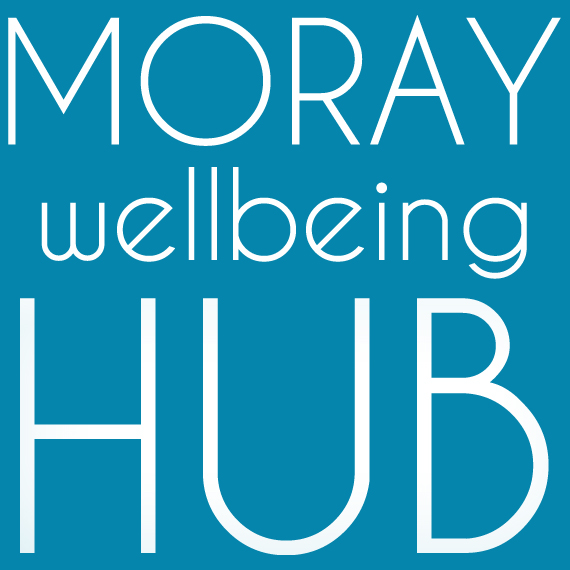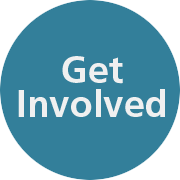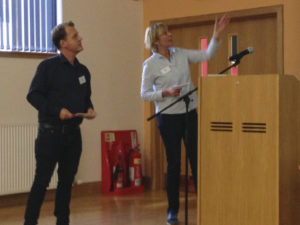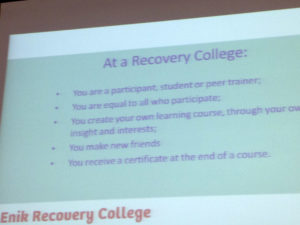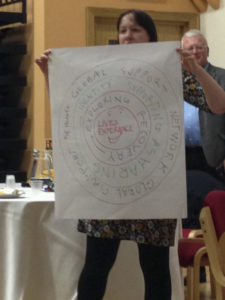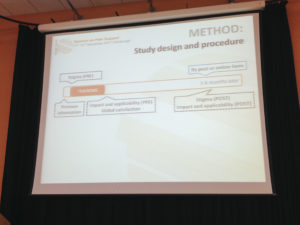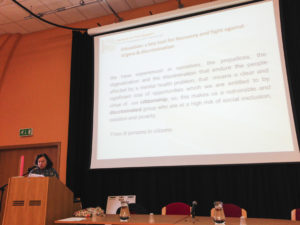This was the 2nd day of the European Capacity Building Seminar on Peer Support and Open Discussion on Priorities for Action, you can read about day one here.
Today’s discussions were lead by the ENUSP which stands for the European Network of (ex)Users and Survivors of Psychiatry. This organisation gives anyone who has or is in receipt of psychiatric support across Europe a way to communicate so that that we can support each other in the personal, political and social struggle against injustice and discrimination. ENUSP is the only grassroots umbrella organisation working across Europe to unite local and national organisations of (ex)users and survivors of psychiatry. The organisation represents directly the views of people who are or have been on the receiving end of psychiatry services. As they describe themselves “Working as one body we stand against stigmatization of mental and emotional distress, madness, human suffering and unconventional behaviour”. Members are only independent organisations or individuals with direct experience of mental or emotional health crisis, no parents, carers or professionals. ENUSP works to influence policy and services at a European level, in short, a lobbing group.
This was a short morning meeting. There were about 15 people. Apart from Nigel Henderson, Cheif Executive from Penumbra, who was hosting the event and I everyone else in the room was from all over Europe representing themselves as independents and organisations. The morning was a bit disjointed as a couple of the speakers learned that morning that their flights were brought forward so they either couldn’t speak or had to present a shortened version. This confusion coupled with language difficulties created a challenge for me to capture in-depth notes….not my strength at the best of times, so here goes.
The first speaker was Stephanie Wooley she is an ENUSP board member for the south-west region and was based in France. She openly shared her personal experience of being sectioned 3 times in 3 countries and as a result of this, “saw how people were treated and knew there had to be a better way”. Stephanie gave a very quick run down of what has been going on. ENUSP has members in 25 European countries, it runs a European patients forum, an ENUSP facebook group, an ENUSP yahoo group and monthly board meetings.
I felt a bit out of my depth in the first section as the speaker was speaking about campaigns and European groups for Human Rights….lots of facts and figures.
Then Jolijn Stantegoeds spoke about priorities for advocacy: what needs to be achieved/changed. Possible means of achievement.
He spoke about the personal ombudsman in Sweden (in place since 1995), which provides supported decision making – a paradigm shift from substitute decision making to supported decision making for forced psychiatric admissions. (CRPD article 12 on legal capacity) The state should supply this support if needed ie. If no family or friends. Personal Ombudsman is a professional, highly skilled person who works 100% on the commission of his clients only. Not in alliance with psychiatric services or social services or any authority, not even the person’s relatives. Personal Ombudsman operation costs approx 80,000 Eros per assisted person over 5 years. For every 1Ero the government spend on Personal Ombudsman system they gain 17Eros from the European Union. This is a completely confidential service driven by the client. All paperwork will be destroyed when the client is finished with the Personal Ombudsman.
Then Catherine, a German woman spoke about her work in a runaway house where she worked for 8 years. She spoke of their participation and empowerment best practices, “Nothing about us without us”. this model was originally brought from the Netherlands. People are protected from psychiatric assault, the runaway house is a crisis shelter that operates with no hierarchy and is based on mutual respect and transparency and is a protected retreat centre where people define their needs. This homeless unit is outside of the welfare system it is funded by homeless community sector money and only exists in a gifted house in Berlin.
Then Franco Basalia, an Italian psychiatrist and neurologist and Giorgio Antonucci, a physician, surgeon and psychoanalyst were quoted. Both these men questioned the basis of psychiatry “all psychiatric diagnosis is not a medical diagnosis but a judgment” and advocated “communication not incarceration”. In Norway, there is a psychiatric hospital that is meditation free.
Then there was a discussion on Peer Support and some of the barriers to effective peer support, “as seen as committing a kind of betrayal”, “peer staff – a cheap way of ‘helping’ stay on meds”, “power imbalance when peer support workers paid – ‘the oppressed become the oppressors’”, “ assigned tasks may conflict with values”, “mini-me – mini spys”, “some peer workers in hospitals are only peer workers in names”. Some success of best practice “informed is empowered”, “transformative impact peer staff can have on culture”.
Everyone did agree this was a time of change where barriers were shifting and moving and we finished there with a dream to reconnect in the foreseeable future.
Marion, MHW Champion.
